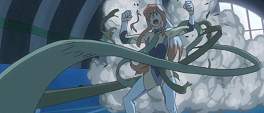First released: July 2008
Version reviewed: DVD
It’s relatively common knowledge that the second season of Birdy the Mighty: Decode is better than the first. When I’d finished the first season I found that claim odd because although I echoed the sentiment of many people that it was good but not outstanding, I wondered how the second season could improve on the formula.
Boy meets girl, boy ends up cohabiting girl’s body. It certainly feels familiar in the same way that any gender-bending situation is - Kokoro Connect, Ranma ½, Kämpfer et. al. - but here there is the quirk of the girl being an absurdly strong intergalactic investigator on the hunt for dangerous criminals on the “backwater” planet Earth. I thought I knew what to expect from that sort of introduction which perhaps explains why I stopped watching it when it first aired in 2008. It’s fair to say then that my expectations were challenged in the first season, then totally surpassed by the second.
Depending on your astuteness, the first thing you’ll notice about Birdy is the art style. As I’ve said before, I am no connoisseur of animation but know that if you’re going to go with a flat style that eschews gradients and shading, it’s either saving budget or in service to motion. This is most definitely in the latter camp with the entire series gifted with a pleasant personality to the characters’ movements but doubly so during the action set pieces that increase with frequency as the series progresses. Birdy is tall and lithe by design so she bounds and cartwheels about the city with effortless, technologically enhanced grace but isn’t shy about applying blunt force trauma to ne’er-do-wells and lawbreakers. The scenery follows suit with masonry cracking, glass shattering and wood splintering as other-worldy creatures clash, especially so in the climax to the second season which sees Birdy fight in a ruined city, bursting through crumbling buildings and trickling water mains with destructive abandon. It’s brilliant to watch even if the character are little more than sketches trading blows at some points.
Where the style comes into its own though is with the second season’s escalation in viciousness. That may sound a little sordid, however the first thirteen episodes always hinted that there was more bite to the story than it was letting on. Sure Birdy still punches and spins with dizzying kineticism but her foes are marionettes or similarly powered critters making the fights seem strangely bloodless. It’s even odder when you consider the first season’s storyline concerns an indeterminately powerful weapon of extreme destructive potential that is hidden away on Earth.
It fits with that season’s antagonists who are all on the spectrum between grotesque and maniacal - the tellinging named Shaymalan is resolutely the latter - but rarely do they feel like a credible threat. Contrast this with the second season’s story that starts similarly with escaped intergalactic criminals but is much more personal to both Birdy and the other people involved; so when death happens, it is bloody, savage and has a permanence to it that ripples across the other characters.
The crux of both seasons though lies with their depiction of love. In the first it is the adolescent Tsutomu who accepts cohabiting a body with Birdy and the knowledge that there is other intelligent life in the universe remarkably well; whereas in the second it is Birdy herself and a man from her past. Both stories are markedly different with Tsutomu and Sayaka’s adorable puppy-love all shy glances and furtive motions juxtaposed against Birdy’s slow burning, almost familial romance. Tsutomu’s storyline is certainly a contributing factor to the first season’s divisive mentality with “stupid teenagers” playing a large part in proceedings. It certainly isn’t insufferable mainly thanks to Tsutomu being genuinely likeable without permanently playing the insufferable white knight, yet it’s no crime that he is shoved to the sidelines in the second season with his emotional arc wrapped up allowing Birdy and her past to take the spotlight.
The second season is certainly more thematically rich than the first with not only Birdy’s romantic love to contend with but her conditioned attachment to machines. This starts in the first season with a sucker punch of a “death” in the third episode that is affecting even then, but given context from the second season it is made all the more poignant. Her love interest Nataru isn’t skimped on either, with his part in the story rife with grief and tension that is played out best in the two episode jump back in time.
It’s odd to laud something like that when, ordinarily, back story is used as a crutch for shoddy storytelling, yet here, as well as being contextualised within the story (context that has its roots set all the way back at the start of the first season) it serves to enrich the kind of world Birdy grew up in. It’s alien certainly but has a pleasant cosmopolitan atmosphere to it with seams of discord running beneath it. This isn’t the hermetic worlds of Star Trek nor the pioneer mentality of Star Wars but something quite its own. The science and the particulars of the spacefaring universe aren’t elaborated upon but they don’t need to be when even Birdy’s insectoid commander has a gravitas and personality to him.
This extends to Birdy as well long before the focus on her in the second season and is one of the reasons why her outfit - all exposed skin and figure hugging meta-materials - isn’t anywhere near as titillating or distracting as it could have been. The other reason certainly goes to the direction which almost resolutely steers clear of tit and bum angles and avoids any kind of teenage lewdness with the fact that a teenage boy is occupying the same body as a curvaceous woman. Birdy has a wonderfully forthright personality and an agency that makes her a joy to watch, and though ridiculously powerful, she never feels overpowered which is a difficult balance to strike.
That same balance unfortunately doesn’t extend to some narrative elements, with the ending to the second season a significant black mark. All of the major points are wrapped up with a suitably epic scuffle to round things out, but dangling plot threads from both seasons are irksome. So the role a mysterious man in black (sunglasses at night time and all) who was instrumental to many of the events in the two stories is entirely unexplored. So too is the child that Shaymalan retrieves from a test run in the first season. Or there are the larger issues with certain antagonists walking away unscathed, romantic subplots left unfulfilled or even the kind of strain Tsutomu's dual life puts on his freidnships. It’s almost as if the series as a whole was expecting just one more episode, maybe even a whole other instalment, to tie everything up. Or perhaps that’s just wishful thinking with the creators wanting to leave enough junction points should the opportunity for more ever present itself.
A lot of those creators though are shared with the wonderful Noein, while Masami Yuki who penned the original manga of the Birdy: The Mighty was also responsible for Patlabor. First released in 1986, the source material goes some way to highlighting perhaps why the first season feels so unspectacular: it comes from a different time. And that’s not just the egregious use of RealPlayer or early versions of Mozilla.
It’s still a fantastic watch, but that what it has in heritage it trades off spectacle it more than makes up for in competence. There is no slack in Birdy The Mighty: Decode, it idles high with no segregation between “story” and “fluff” and pulls together a lot of characters and threads without missing a beat. The first season then serves as a foundation for the immensely brilliant second which cleaves away what little cruft there was, leaving a story of love and revenge, that makes you think on the price of justice and one’s relationship with machines above humans. It is equal parts sad and exhilarating and it might not trip the unique flags that would make it a breathless recommendation, but it is a familiar story well told. Sure it might leave you wanting more by the end of the second season (and before you ask, the OVA will not slake your desire for more) but neither season is ever less than brilliant and the second is frequently amazing. It is not so much having to “sit through” the first season to get to the second then, as it is enjoying the first with the knowledge that the second is even better.
















